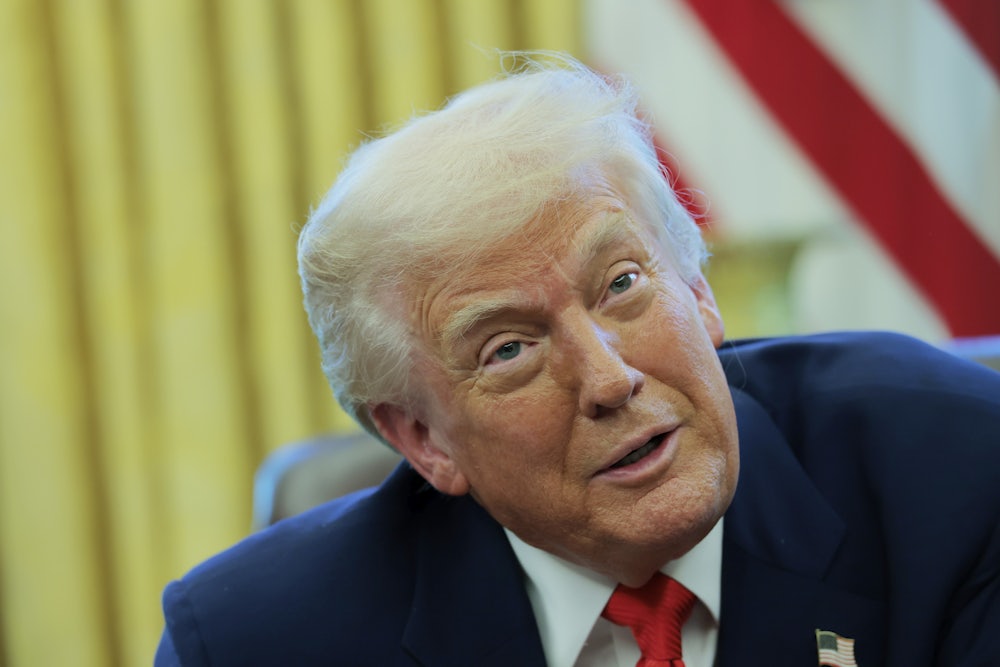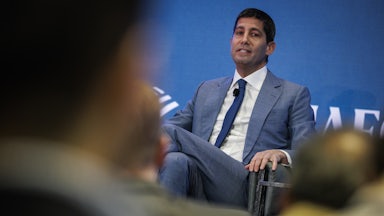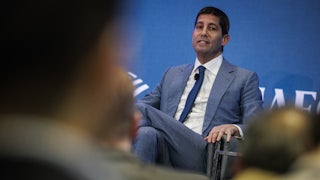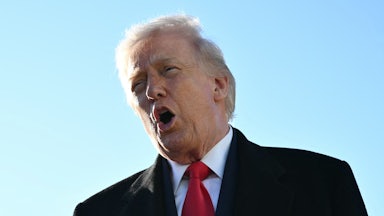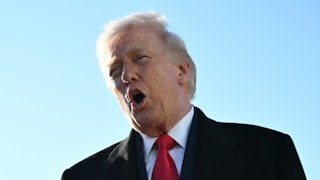President Donald Trump brought the stock market to the edge of a bear market (i.e., a sustained 20 percent drop) by imposing ridiculously high tariffs indiscriminately around the globe. That was so much fun that on Friday he shared a video on Truth Social titled “Trump is PURPOSELY Crashing the Market.” Then, on Wednesday, Trump put those tariffs on hold for 90 days for those countries willing to negotiate over trade barriers real or imagined (though Trump’s 10 percent “everybody tariff” will remain, and China will be punished for its defiance by raising its tariff to 125 percent). After Trump announced the tariff suspension on Truth Social, the S&P 500 recorded its third-biggest gain since World War II. Trump must have felt like Moses parting the Red Sea.
We can all be grateful that Trump was willing to undo, at least temporarily, the worst of the damage he inflicted. But it would be wrong to conclude, as Wall Street likely will, that there’s a “Trump put” after all. The “Trump put” is a fancy way of saying that whenever Trump does something that inadvertently sends stock prices down he can be counted on to reverse course and push them back up. (A put is an options contract that limits losses in a down market to a fixed amount.) The long-standing presumption of a Trump put is why 52 billionaires, including Timothy Mellon, Steve Wynn, and the Winklevoss twins, backed Trump in 2024.
These plutocrats, or others like them, exerted as much pressure as they could on the Trump administration to reverse course. Some, including Bill Ackman, Kenneth Griffin, and Stanley Druckenmiller, did so publicly. But they’d be foolish to conclude that Trump learned his lesson. Momentary appearances to the contrary, their commander in chief is governed not by realpolitik but by pathology.
I’m bracing myself for sycophantic Fox News analysis of Trump’s masterstroke in bringing more than 75 countries rapidly to the bargaining table. (Ackman, who proposed the 90-day suspension before Trump imposed it, posted late Wednesday on X: “This was brilliantly executed.… Textbook, Art of the deal.”) But we’ve seen this pattern in trade policy before. Trump makes some grandiose threat; the targeted country makes some trivial, often substance-free concession; then Trump, who may or may not recognize the concession’s triviality, proclaims victory.
In Trump’s second term, the foreign leader most skillful at playing this faux appeasement game is Mexican President Claudia Sheinbaum. But Sheinbaum has learned the hard way that you only ever achieve a temporary reprieve. Thus Sheinbaum, after easing Trump off in February from a threatened 25 percent tariff by pledging to send 10,000 troops to the border to fight drug traffickers, then had to wheedle a second tariff delay in March, and then a third in April. On the last go-round, Trump imposed the 25 percent tariff but exempted, at long last, various goods, including some automobiles, covered by the United States Mexico-Canada Agreement—an exemption not included in the previous two go-rounds even though that treaty was negotiated by Trump himself. Sheinbaum is now trying to secure additional exemptions for those Mexican automobiles not covered by USMCA. The dance never stops.
What Trump demonstrates here is not a strategy but a mental illness. I’m not the first to observe the striking resemblance between Trump’s governing style, particularly on tariffs, and Factitious Disorder Imposed on Another, more commonly known as Munchausen syndrome by proxy. It involves either pretending that a child is sick or inducing sickness so that you can luxuriate in restoring the child to health. (A wife who delights in sickening her husband with poisonous mushrooms, and then nursing him back to health, is an FDIA plot element in the 2017 film Phantom Thread.) According to the Cleveland Clinic, a common cause of FDIA is “wanting attention from others,” which of course fits Trump’s malignant narcissism like a glove. A shaky understanding of cause and effect, which the child psychologist Jean Piaget identified as transductive reasoning, would also seem consistent, and I’ve written previously that Trump has got that even though most people grow out of it at age 7.*
The only difficulty with diagnosing Trump with FDIA (apart from my not being, ahem, a psychologist) is that typically it’s motivated by love—or some deranged conception of love—and no malignant narcissist can ever love anyone but himself. In Trump’s case gratification comes from experiencing not a feeling of closeness in another person’s dependency but rather a feeling of schadenfreude in another person’s humiliation and surrender. Being Trump, our president said this out loud earlier this week at the Republican Congressional Committee Dinner. “I’m telling you, these countries are calling us up kissing my ass,” he said. “They are. They are dying to make a deal.”
The day before Trump let up on tariffs, he met with Israeli Prime Minister Benjamin Netanyahu. Trump’s foreign policy regarding Israel can be summed up as “Whatever Bibi wants, Bibi gets.” But not on tariffs. Netanyahu told Trump that in response to the 17 percent tariff Trump slapped on Israel he would eliminate “very quickly” all tariffs and trade deficits. But asked later whether he would lift the tariff against Israel, Trump replied: “Maybe not, maybe not.” This isn’t diplomacy. It’s pleasure in witnessing others grovel.
Trump is master, not of the deal, but of the welsh. We know how this is likely to play out. He’ll let up for a bit and then he’ll impose crazy sky-high tariffs again. He’ll do it in large part because, as I’ve explained before, he doesn’t care about negotiating better trade deals; he just wants tariff revenue to replace as much of the progressive income tax as he can. But Trump will do it also because he loves to see the stock market go down when he says “Go down!” and up when he says “Go up!” And because he loves it when American oligarchs and foreign leaders beg, “Please stop!” Caregivers with FDIA don’t poison their children once and then restore them to health. They do it over and over, because the cycle from sickness to health brings them pleasure. Trump is like that. Other nations understand this. So don’t expect the global economy to recover all that much from the Liberation Day massacre. Word is out that, at least for the next four years, the United States can’t be trusted on economic policy—or much of anything else. Whenever the patient looks too well, Trump will reach for the poisonous mushrooms he stocks on a high shelf in the pantry.
* This article originally misnamed Jean Piaget.
